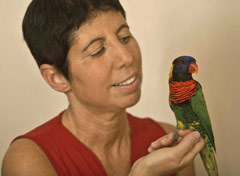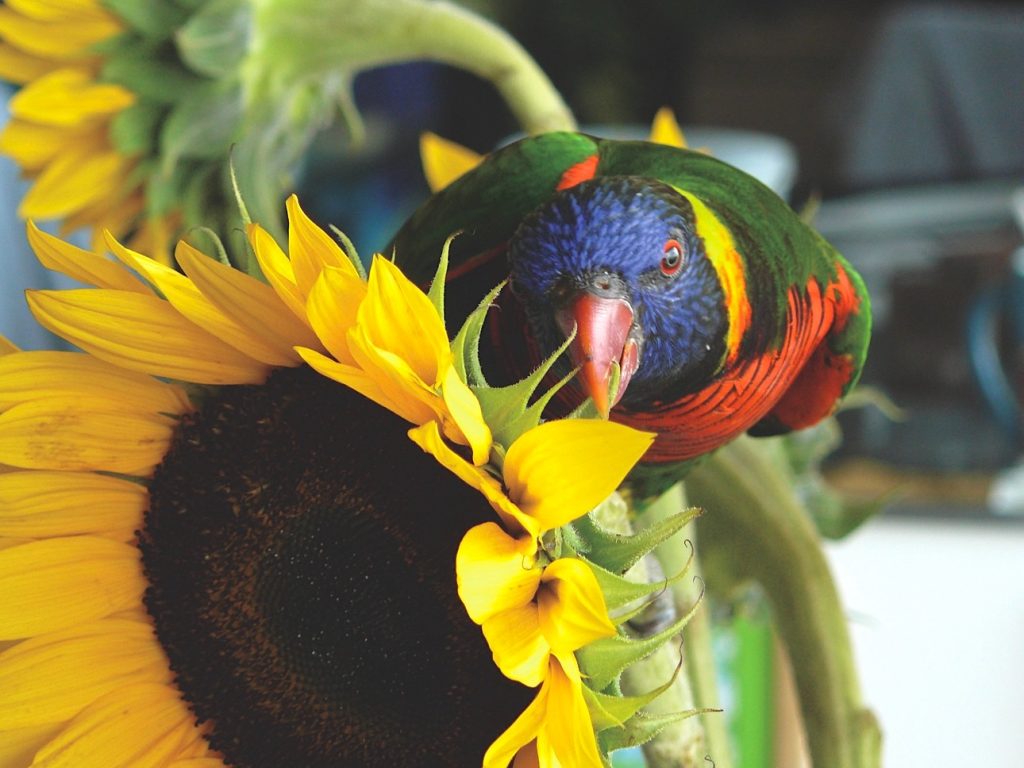‘Though she be little, yet she is fierce,” Shakespeare wrote of Hermia in Midsummer Night’s Dream. It would be an apt description of Mira Tweti, a 5-foot, 2 1/2-inch, 108-pound animal-welfare writer and Zen nun who’s probably the best friend any bird—captive or wild—could ever have. Tweti’s exposé of the parrot trade industry, Of Parrots and People: The Sometimes Funny, Always Fascinating, and Often Catastrophic Collision of Two Intelligent Species, published this fall, is rattling bird breeders across the country— maybe the world—and challenging parrot owners to reconsider the wisdom of keeping a caged companion.
“This book, I think, will drive bird breeders to violence,” Tweti says matter- of-factly. “I’ve had breeders tell me that it’s all lies—and that I hadn’t said all the good things they’ve done. Like what? That they’re keeping the ‘stud books’ on parrots? Stud books are for horse breeders. That has nothing to do with keeping parrot species alive.”
Tweti (yes, it’s her real name, pronounced “tweety”) didn’t set out to be an animal advocate, it just evolved. She’s an award-winning journalist—an occasional contributor to Tricycle—and a filmmaker. Her investigative writing for the Los Angeles Times has helped change legislation in California on cat declawing and treatment of animals in pet stores, and was instrumental in the passage of the 2003 “baby bird bill” that prevents pet shops from selling unweaned birds. Tweti’s thirty-minute film, Little Miss Dewie: A Duckumentary, about an Indian Runner duck she rescued, is making the rounds on the festival circuit, sure to open eyes to the challenges facing our web-footed friends. She’s expanding Dewie to an hour-long version that will include footage on gavage, the abusive force-feeding of geese to make paté de foie gras. Then, too, there are book signings for her children’s book, Here, There, and Everywhere, for which Jane Goodall wrote the foreword. Most of the proceeds from the book are going toward parrot rescue, avian welfare, and animal protection.
Through it all, Tweti remains Reverend Tam Xa, an ordained dharma teacher in the Vietnamese Zen tradition. Appropriately enough, her dharma name means “giver of lovingkindness.” But if you’re thinking of lovingkindness practice as warm and fuzzy, think again. Tweti’s a fearless and super-articulate dharma warrior, fighting for the rights and preservation of the 350 or so species under the parrot flag. Her passion extends to all creatures: she’s been a vegan for over four years. (If you aren’t at least vegetarian, don’t ask her to dine unless you’re ready for her to eviscerate every excuse you have for eating flesh. “I can’t even look at chicken on a plate,” she says with a shudder.)
Feeding Dewie, the rescued duck, posed a terrible ethical dilemma. “Here I am talking about being a Buddhist monk, now I’m going to go out and buy worms for my duck,” Tweti says in the film. “There all my precepts go, out the window.” (Dewie’s gone, but to atone, she’s still raising the worms.)
Tweti was ordained in 1994 by the Venerable Karuna Dharma, an American-born Vietnamese Zen teacher who is abbess of the International Buddhist Meditation Center (IBMC) in Los Angeles [see “Daughters of the Buddha,” Tricycle, Winter 2006]. Karuna’s teacher, Thich Tien An, a Dharma brother of Thich Nhat Hanh’s and founder of the IBMC, devised the designation “dharma teacher” for nuns and monks who, like Tweti, live in the world “like a missionary.” These days, Tweti’s mission is clear: “I’ve uncovered a major issue—a crisis going on in the U.S. regarding parrots. Can I solve the parrot crisis? No. My goal is to relieve as much suffering as I can.”
Buddhist practice doesn’t just inform her work, Tweti says, “it inspires it.” It wasn’t always so. Raised an observant Jew in New York City, she moved to L.A. in the late eighties as a film publicist, flying around the world on an expense account, hell-bent on making money. Then, in 1989, her perspective shifted. A relationship fell apart, and for once “I really wanted to learn from it, figure out what went wrong and my part in it.” She asked a woman she knew to recommend a therapist. Instead of giving Tweti a referral, the woman said, “You have to stop looking outside yourself for answers. You have to start looking within. You have to start meditating. I have a temple I belong to. If you’re interested, I’ll take you. You have to call me. I need to know you’re serious.” Tweti went to the Sunday service at IBMC, where she heard a talk on unconditional giving and received meditation instruction from a nun named Ahimsa. “She told me where to put my gaze, and then said, ‘Okay, you’re going to breathe.’ And I said, ‘How?’ and she said, ‘That’s the point: you’re supposed to do it mindfully.’ At the end, she said, ‘You’re meditating as well as I do, and your chances of becoming enlightened are equal to mine, because it’s all in the moment.’”
Tweti continued meditating at home, but she wasn’t interested in joining the sangha. “I loved Zen. I loved the philosophy, the poetry, the beauty of it, but I thought that to be a Buddhist, you had to see the world as a Buddhist—to be raised that way so it was in your cells. I kept going back to the temple so they could check my posture, and I started to fall in love with the dharma talks. When I heard Karuna, it was remarkable. She talked about how to live in the world on a daily basis. And how to live responsibly without guilt and be fully alive.”

Today, Tweti’s work is her meditation, she says. “My practice is the seamless fabric of awareness through the day.” The twenty-five vows she took don’t include celibacy, but she decided on her own to be celibate a year and a half before her ordination. “I wanted to give up something that was really a part of me, that defines us in the world. It was one of the most liberating things I ever did. It was one more deluding passion.” She’s also a recovering clothes horse. “When I’m in robes I feel at home, like I’ve been released from the cycle of craving,” she says. Tweti’s everyday garb still consists of street clothes, more practical when she’s working. But now she wears only animalfriendly brands, mostly “recycled” Morgan de Toi she orders on eBay UK. She keeps her hair in a buzz cut, and her only jewelry is a pair of prayer beads on her wrists. “I bought them in every color,” she confesses.
Parrots came later than Buddhism to Tweti’s life. When she moved to L.A. from New York, she left her cat with her ex-boyfriend and, to console herself, bought a pair of finches. Then, in 1995 at a festival of Pacific Rim cultures, she saw a rainbow lorikeet in a bird breeder’s stall and fell in love. A friend tried to stop her from buying the bird: her marriage had just ended and she was unemployed. But Tweti couldn’t resist. She named the lory Mango.
Later, when she told a monk at her temple how remarkable Mango was, he said she’d known the bird in a previous life. Given the desirability of human birth, Tweti remarked that it couldn’t be a good sign he’d come back as a parrot. “You don’t know that you weren’t a parrot in your last life,” the monk shot back. “That positioned me to think, ‘This is more than a feathered creature; this is a being I had a long connection with,’” Tweti recalls. “It made me treat him like an equal rather than a pet. His desires and needs were equal to mine.”
She built Mango a huge cage but let him fly free most of the day. “That bird raised my consciousness about bird activities,” she says. “Parrots do not love unconditionally. They have demands.” Big demands. Lorikeets live up to 35 years in captivity; other parrot species can reach 100.
When Mango died in 2006, Tweti buried him in the garden of her Zen temple, next to a statue of Kwan Yin, the bodhisattva of compassion. Today, she shares her home in Playa del Rey, an L.A. beach community, with an adopted lorikeet, ZaZu. Still, she opposes keeping a parrot as a pet—unless it’s a rescue and the owner is willing to make the full-time commitment involved. Since 1992, when a law against importing exotic birds went into effect and domestic breeding took over, the parrot population in the U.S. has ballooned from 14 million to as many as 50 or 60 million, by industry estimates. Two million parrots are sold each year, yet countless others are abandoned or given away when their owners figure out they aren’t “fish in a cage,” as Tweti puts it, but more like rambunctious two-year-old kids. Parrots test out with the intelligence of four- or five-year-olds, smarter than any primate but man. And they’re even more social than humans. Parrots live in flocks in the wild, so locking them in cages is tantamount to condemning a prisoner to solitary confinement, Tweti says. “If someone got a puppy, and you found out six months later they kept the dog in a cage and it never set foot outside, it would be animal abuse.”
Tweti isn’t finished advocating for birds; in fact, she’s just warming up. Now 51, she says, “This is the best time of my life.” For her next book, on avian rescues, she’ll take on abandoned parrots and water fowl, and the factoryfarming of chickens. And there’s always the environmental angle on the parrot story: “If we’re not taking the parrots out of the trees, we’re taking the trees out from under the parrots,” she told her audience during a screening of Little Miss Dewie and Birds of a Feather, a documentary shot in the 1990s, at her alma mater, Hunter College, in Manhattan. “It’s not enough to do what you can for an animal,” Tweti says in Dewie. “You have to do all you can. You can’t just be a force for good for yourself— to make yourself feel better, to live more peacefully in yourself. There’s no time for it, because we really are in dire environmental straits.”
Sometimes, when she considers the plight of parrots, Tweti is overwhelmed with grief. She once asked Thich Nhat Hanh, one of her teachers, how he had kept going during the Vietnam War. “If you want to save the drowning, you can’t stop swimming,” he told her. You won’t catch Tweti treading water.
Thank you for subscribing to Tricycle! As a nonprofit, we depend on readers like you to keep Buddhist teachings and practices widely available.
